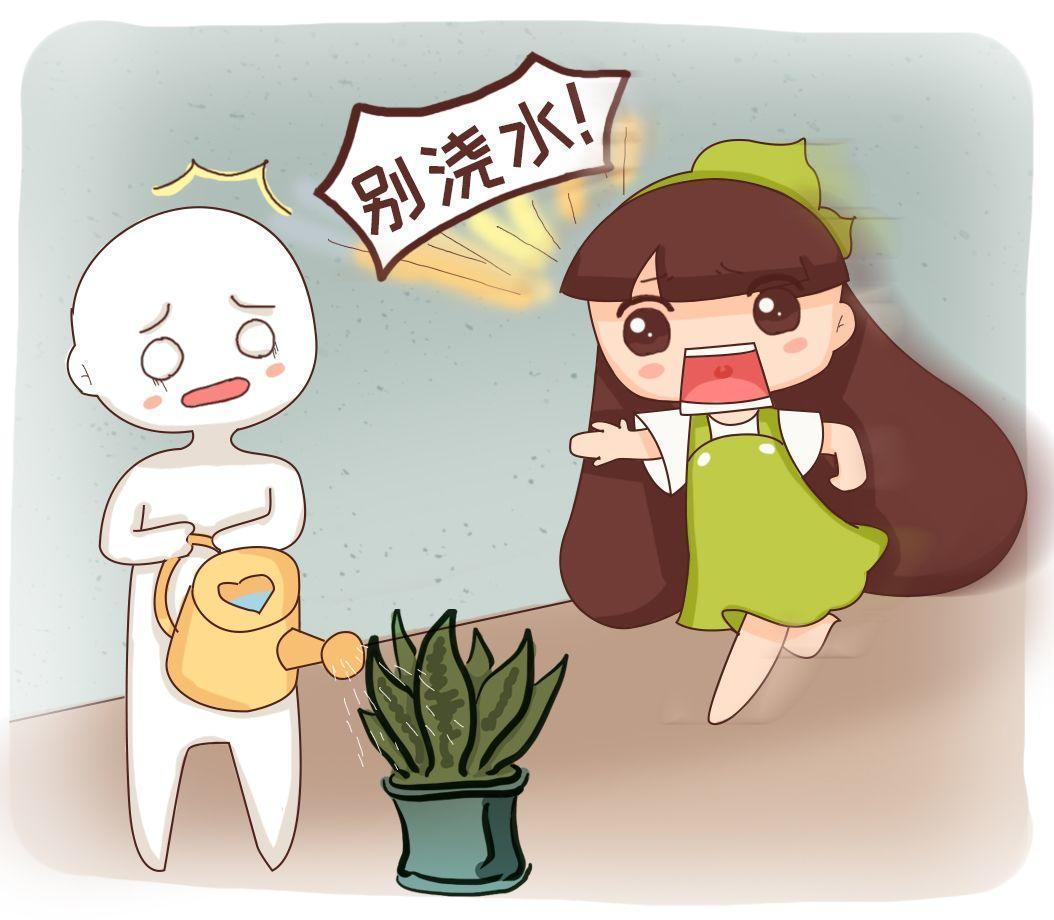Don't water these 10 kinds of flowers. the more you water them, the faster they will die.

The flowers are dead, 99% of them are watered, not too little, but too much! For example, the following 10 kinds of flowers, as soon as the water is too much, the roots will rot, but they will flourish regardless of the fact that they grow. Today, Huahua will tell you how to water these flowers.
The rich tree is watered once a month, but its roots don't rot in three years.
The root system of the rich tree is weak, and there are almost no sturdy roots. If there is a little water in the basin, it will rot and blacken, and just the rotten roots cannot be found. Once found, it will not be far from death!
(overwatered rich trees)
Watering key points
1. The rich tree is resistant to drought. It can be watered twice in 1 to 2 months. It is no problem to dry it a little bit. Do not accumulate water. You can insert a bamboo stick in the basin and water it when the surface of the bamboo stick is white and dry.
2. Spray more water on the leaf surface when the weather is dry.
3. In order to avoid stagnant water, the flowerpot should not be too big or too deep. You can pad some ceramsite or broken bricks on the bottom of the pot, and the soil layer is mixed with sand, so that the roots will not rot.
Tiger skin orchid is watered once every two months, and the leaves are full and greenish.
Tiger skin orchid is a desert plant, extremely drought-tolerant, too much watering, light leaves turn white, markings become light, heavy rotten roots and rotten leaves.
(the tiger skin orchid has rotten roots)
Watering key points
1. Control watering and water once from January to February. When the soil is dry and wet, you can knock on the basin wall with your hand, and the sound is clear, indicating that the soil is dry and can be watered thoroughly.
2. You can insert a straw in the flowerpot and irrigate several columns of sand, which can not only increase air and water permeability, prevent rotting roots, but also prevent soil consolidation.
The longevity flower blossoms more and more under water control.
The longevity flower is a succulent succulent plant with more water in the body and less water demand. It is very drought-resistant, and it is easy to black rot if watered too much. If it is light, the roots will rot, and if it is heavy, the roots will rot.
(longevity flowers with severe black rot)
Watering key points
1. Longevity flowers should be watered in accordance with the principle of "better dry than wet". Water the soil thoroughly every time when the soil is dry.
2. Summer and early autumn are high-risk seasons for longevity flowers, which are easy to rot. It can be irrigated once or twice a month and should be ventilated after watering.
Aloe has been running for months.
Aloe has strong drought resistance, and aloe from the soil can even dry for months without dying! Poor soil drainage or rain and stagnant water can easily lead to leaf shrinkage and root rot.
(rotten roots and leaves caused by aloe water)
Watering key points
The main results are as follows: 1. Aloe leaves have strong water storage capacity, which can be watered once or twice a month.
2. Be careful not to water the leaf core when watering, otherwise it is easy to burn and rot in the sun, and there will be more ventilation after watering.
The geraniums are watered once a month, and the buds rub off.
Pelargonium is native to southern Africa, most afraid of water moisture, the soil is moist for a long time, which can easily lead to excessive growth of branches and leaves, soft rot of stems, non-flowering and other symptoms!
(the geranium yellowed and rotted after too much watering)
Watering key points
Watering should be dry and wet, and water should be strictly controlled in summer to avoid getting caught in the rain; summer and autumn is a high-risk period, so we should be on guard against autumn tigers, watering them once a week or twice a week, and putting the windowsill after watering.
The less the cactus is watered, the more the cub will explode.
Cactus is originally a desert plant, like high temperature and dry environment, very drought-resistant, too much or too often watering will cause the ball to rot!
(cactus water has rotten roots)
Watering key points
1, summer high temperature season, cactus is in the growing season, can be watered twice a month, the rest of the time to bask in the sun, the more likely to burst the basin.
2. After the beginning of autumn, water can be watered once every two months, or even once in February or March in winter, so that you are not afraid to dry!
The crab claw orchid is watered once every ten days and half a month, but it is difficult to rot the root.
Crab claw orchid itself belongs to the cactus family, strong drought tolerance, avoid high temperature and humidity, especially in summer, a lot of water will rot the root!
(crab claw orchid watered during dormancy)
Watering key points
1. During the dormant period in summer, water should be strictly controlled and watered once a month, which can be sprayed frequently. After autumn, the watering frequency is gradually increased, once every 7 to 10 days.
From February to October, crab claw orchid begins to conceive buds and should be sprayed with water frequently. Potassium dihydrogen phosphate can be added to the kettle and foliar spray, which is conducive to flowering.
Desert roses get stronger and stronger with thirst.
Desert rose has a large fleshy root, strong water storage, drought resistance, avoid water dampness, it is easy to get soft rot, stagnant water, rain, hot and unventilated and other conditions will cause root rot!
(too much watering of desert roses causes soft rot to stink)
Watering key points
1, watering should be dry and thoroughly watered, according to the dry and wet condition of the basin soil, insert a bamboo stick, the bamboo stick is all dry and then watered, and there is more ventilation after watering.
2, look at the status of the roots can also judge the timing of watering, stomach wrinkles, leaves soft before watering, thirsty to drink water, will immediately return to full state!
If the tiger thorn plum is watered once a week, there are many thieves in bloom.
Tiger thorn plum habit
Prickly plants are generally more drought-tolerant, plum is native to Africa, drought-resistant and barren, afraid of water stains, the soil is too damp and easy to rot roots!
(too much watering of prunes leads to rotting roots)
Watering key points
Watering should be dry and wet, hot weather in summer and autumn, watering every 7-10 days, after cool weather, the growth of Prunus mume is accelerated, and can be watered every 5 days.
Yushu is watered once every 2 months, and its leaves are thick.
Yushu thick branches and leaves, water storage, drought resistance, too much watering is easy to rot roots and leaves!
(Yushu water has rotten roots)
Watering key points
Summer dormancy period, 1-2 months can be watered, after autumn can be watered every 10 days or so, add a few grains of compound fertilizer, can speed up growth!
All right, that's all Huahua wants to introduce to you.
Flower friends, can you water it?
Share it with your friends.
Don't water the flowers to death again!
- Prev

Asparagus actually climbed to the roof. How to raise it?
Asparagus is a common ornamental potted plant in our daily life, which is not only fresh and good-looking, but also has the fengshui effect of promoting learning and literary talent. Many people know that asparagus burst into pots, blossom and bear fruit. But because florists are usually.
- Next

Pinch a branch and wrap it in a piece of paper for 7 days. A 3-year-old can cut it alive.
Speaking of the most common things in our lives, it must be paper towels, whether wet paper towels or dry paper towels, Huahua is basically necessary to go out. In addition to daily needs, in fact, paper towels also play a super role in flower cultivation! ...
Related
- Wuhan Hospital Iron Tree Blooming Result Was Instantly Frightened by the Gardener Master
- Which variety of camellia is the most fragrant and best? Which one do you like best?
- What is the small blue coat, the breeding methods and matters needing attention of the succulent plant
- Dormancy time and maintenance management of succulent plants during dormancy
- Minas succulent how to raise, Minas succulent plant pictures
- What are the varieties of winter succulent plants
- How to raise succulent plants in twelve rolls? let's take a look at some experience of breeding twelve rolls.
- Attention should be paid to water control for succulent plants during dormant period (winter and summer)
- Watering experience of twelve rolls of succulent plants
- Techniques for fertilizing succulent plants. An article will let you know how to fertilize succulent plants.

